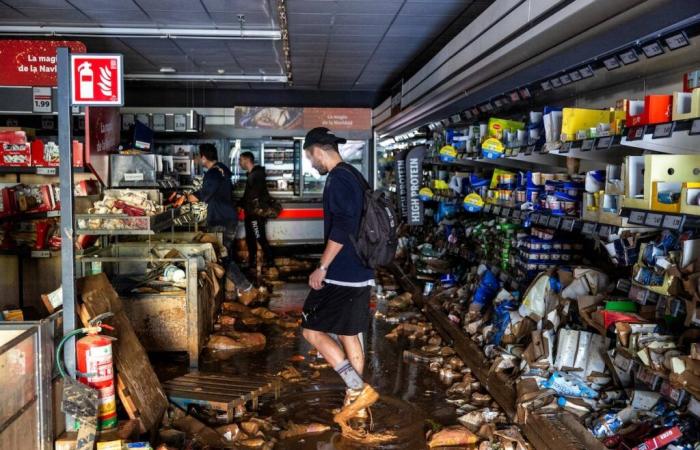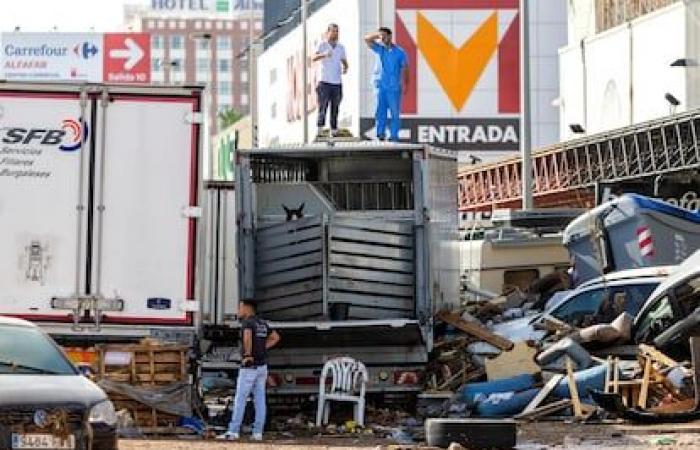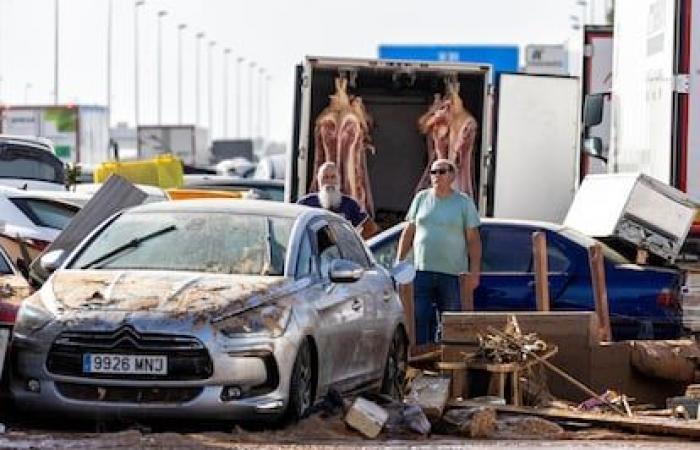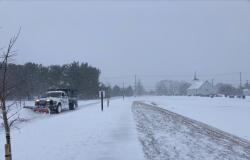Tomorrow seems like another world, one impossible to imagine. At dawn, La V-31, the entrance highway to Valencia also known as Pista de Silla, is a water walkway with trucks stacked, one on top of the other. There are fireflies in the darkness – the power has been out since Tuesday afternoon – who are actually people isolated or in small groups who are supposed to have a good reason to grope through the destruction instead of staying in their homes. In the center of the city the parking It will stop being free at nine in the morning, but the traffic tow trucks will direct their efforts in another direction during the day on Thursday. They will start as things begin, at the beginning, and they will try to reach, car by car, truck by truck, until the last vehicle. Although it is impossible, V-31 is an unfathomable odyssey at dawn. The deaths in the province amount to more than 200.
Francisco Pérez, a 64-year-old retiree who lives in the heart of Alfafar (21,879 inhabitants, Valencia), says he cannot stand another day without bread. The man walks alone on the shoulder of the road, with his hands in the air in a kind of continuous balance and the will to reach Sedaví, another municipality also affected by the floods two kilometers away. “They have told me that there are bars of the day, to see if any baguette… I don't know, because without electricity at home we haven't been able to watch television. We are the ones who are closest and the ones who know the least,” says Pérez.
Before eight in the morning, a small group of people begins to approach the Alfafar commercial area. The first stores are large dealerships with broken windows. José Manuel Caballero Lita, 50 years old, resident in Malvarrosa, arrives on his motorcycle to the door of what until 48 hours ago was his job. This painter left on Tuesday at 6:30 p.m. with the pleasure of having fulfilled his duty after leaving a Mitsubishi Space Star in the paint booth almost spotless. He has arrived armed with a can of tuna and some slices of bread. Inside it has two kiwis, a yogurt and some lasagna. “I came to see if I finished the job, since I still had to finish the hood,” he says. As you look up from the steering wheel, you realize the true magnitude of what's in front of you. “I'm collapsed, no, what's next,” he admits without getting off the moped and witnessing the tragedy.
A few minutes later, the painter's two superiors arrive, Rafael Moreno, 55, the dealership manager, and Juan Antonio de Angulo, the sales manager, 57. Both have shown up, according to them, to “take the photos that they will send to the insurance.” They enter almost hand in hand and once inside they separate to check the damage. The accumulated water, mixed with oil from the cars, covers them above their ankles. Traces of the flood remain on the walls, which exceeded two meters in height. Their fleet of high-end cars have their trunk doors open and look like they have been handed down a sentence. The emptied drums float from one side to the other. This is not the time for great reflections. The trio of men separately share the same expressions. “Mother of God! “I don't understand anything,” José Manuel shouts when he encounters the white Mitsubishi. Rafael and Juan Antonio, for their part, have already traveled the 200 meters of the warehouse when they remember that they forgot one important thing: the safe. There will be no more than 1,000 or 2,000 euros in severely damaged banknotes. “I think they are still worth it,” Juan tells him.
The shoulders of V-31 are an endless story. In every car, on every corner, someone has something to tell. They are small groups of people who gather together and comfort each other, although the large flow of people is a little further back, in the Carrefour. There the parking It is a car pool, and the interior of the supermarket is a free bazaar for the smartest. Almost exhausted, Juan Carlos, 53, tries to notify the Opel that he finished paying last week with the last charge of 11,000 euros. “It's like everything ends here. How do you recover from this?” he asks himself. The Civil Guard and the National Police patrol the enclave to prevent theft, although it seems an almost impossible mission. The number of detainees has reached fifty during the day. There are dozens and dozens of individuals and families who enter and leave the destroyed establishments. The agents give several warnings over the public address systems of their vehicles, threatening the looters. Still, many cannot avoid rebellion:
—Don't pay any attention! Here all together. Whatever you need, take it. “This is for survival!” encourages teenager Daniel Romero, a small improvised leader in the midst of chaos.
Some people politely ask the security guards if they can “come in for something” and then end up sneaking in through the back door. Maribel Pérez, 46, claims to be desperate because she cannot find food for her dog. “There is only one cat, ma'am,” a young man warns her. Next to him, hidden among the garbage containers are Chimo López, 51, and his daughter Iris López, 21. They live less than a kilometer away, in some residential blocks where there has been no electricity or water since Tuesday night. They look for basic necessities in good condition. They consider themselves lucky after filling two large bags with some rice, rolls, pasta and especially water and Coca-Colas. “We need liquid above all; With that we will get by,” says Chimo, a cabinetmaker by profession. Under a traffic sign bent in half, Iris finds a package of Orlando tomatoes with eight glass jars. Father and daughter fall and throw a bag of thin noodles between them, they fall and collapse in the mud. “But Iris! It was dinner…” he complains.
It is not just people who are affected by V-31. Veterinarian José Luis, 27, dressed in the regulation blue uniform, climbs onto the roof of a stranded truck where twelve polo horses are trapped. This is a very specific breed that is bred and trained specifically for this equestrian sport. On Tuesday morning they disembarked in the Port of Valencia from Palma de Mallorca. They were heading to Sotogrande, a luxury urbanization in the municipality of San Roque (Cádiz). They never went beyond the Rincón del Sofá warehouses, no more than five kilometers from the center of Valencia. José Luis recognizes that from the second day without movement, water or food, the most critical hours begin. “We are on the verge of the first colic appearing, the most common pathology in horses,” says the boy, waiting for private transporters to arrive for an evacuation.
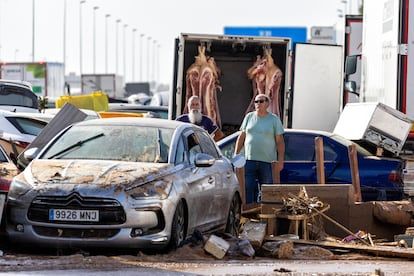
Behind the comfort of the bar at her bar, La Florida, a woman named Georgina Tapia, 60, compulsively updates the news programs that talk about Dana. She says that she “works to not think,” and when she can't take it anymore, she asks the million-dollar question:
—Can everything you experienced be expressed in letters and photos?

